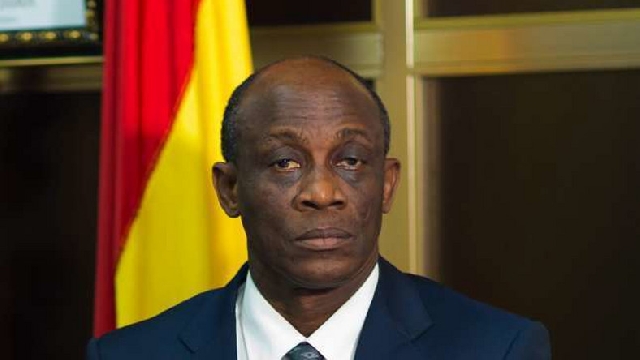Why Terkper may be wrong on double taxation of MoMo transactions
 Seth Terkper
Seth Terkper
Introduction:
Some 1000s of years back, it was reported that two things in life were as certain as the dawn: death and taxes but that whilst there were astonishing cases in which people escaped death, taxes are completely unavoidable. It is common to see people often complain bitterly about high taxes, yet if they were asked whether they would trade out a service provided by government for the removal of a service, many would rather choose to pay the tax. From the perspective of tax policy, every tax just like the mobile money tax must be subjected to at most three test to determine its appropriateness.
These criteria are: the economic efficiency of the tax; its simplicity in terms of administration; and equity or fairness. Whilst the central focus of this paper is to examine the assertion by the former finance minister, Hon. Seth Terkper that taxing mobile money transactions will amount to double taxation, it is important to mention superficially, that the mobile transaction tax (MTT) satisfies the three tax policy tools mentioned supra. Jurisprudence of double taxation relative to mobile transactions tax: Double taxation is a tax principle referring to income taxes paid twice on the same source of incomewithin a country.Double taxation at the international trade or investment level is when the same income is taxed in two different countries. Indeed, they may even be cases of triple or multiple taxation in situations where the same source of income is subjected to series of taxes either within or without.
However, the discussion of double taxation in this paper will be limited to the first explanation, as in same source of income being taxed twice within a particular country.
If this definition is contextualized within mobile money transactions, these will be the breakdown of the conclusion of double taxation as alluded to by Hon. Seth Terkper: 1. If the Mobile Transactions Tax (MTT) were to be imposed on subscribers for engaging in any form of mobile money transactions including transfers, withdrawals, deposits, payment of bills (DSTV, electricity, water etc.), payments of other tangible and intangible items - in addition to this tax, to the extent that subscribers are already subjected to the Communication Services Tax (CST) under the CST Act, 2008 (Act 754), then that will be double taxation; 2.
If the MTT were to be imposed on fees/charges or even commissions (herein called ‘transaction fees’) received by the service providers which include the mobile network operators (MNOs) and the mobile money vendors, then in addition to this 2 tax, to the extent that they are already subjected to the communication services tax (CST), it is argued that it will amount to double taxation; 3.
If the MTT were to be imposed on both the subscribers for use of the service and to the transaction fees of the service providers, it is again concluded that because these subscribers and service providers are already paying a CST of 9 percent, then it will also constitute double taxation both to the subscribers and to the service providers. Specifically, for purposes of emphasis and analysis, a reference of what the former Hon. Minister said as reported by Citi Business News on Friday, November 15, 2019 is reproduced verbatim:“A former Finance Minister, Seth Terkper says any taxation levied on fees charged by mobile money operators on transactions would amount to double taxation.
Mr. Terkper stated that income earned by MoMo operators are already subject to VAT and any separate tax will be duplication and “punitive” on the companies. In a series of posts on microblogging site Twitter, the former Finance Minister explained that telecom services were included in the original VAT Act (Act 546) passed in 1999. Talk of MoMo or umbrella tax is duplication and punitive for firms & consumers. Telcos pay income (corporate) tax on MoMo fees & charge VAT/CST (now at higher 9 percent) on same.
Government should be clear, if it is talking about another consumer or umbrella tax, likely in 2020,”. Analysis of double taxation relative to mobile transaction tax: Before any analysis can be done, it is important to differentiate between mobile money tax (MMT) and mobile transactions tax (MTT). MMT is limited in its scope to purely taxing monetary transactions including transfers, deposits, withdrawals and payments of some services such as electricity, water, entertainment etc.
However, MTT is more encompassing and not only include mobile financial transactions but also the taxation of the incomes generated from the use of mobile platforms provided by Mobile Network Operators (MNOs) for digital economic activities which include advertisements, buying and selling, currency trade, loan solicitations, payments of digital services as well as purchase and supply of tangible and intangible products. An example is the e-commerce platform provided by Kenyan Safaricom.
Since the paper is about the assertion of double taxation occurring in mobile money transactions which is being described as punitive and for that matter a sin tax, let us examine the following real scenarios and see whether the same argument can be said of these cases: 1. Companies in Ghana generally, pay corporate income taxes of 25 percent save as companies engaged in the petroleum industry that will have to pay 35 percent of their profits as tax. After these taxes, if the same profits are being distributed as dividends to shareholders, 8 percent of each distribution going to a shareholder is withheld as a tax.
Thus, bringing the total tax imposed on company profits to 33 3 percent or 43 percent as the case may be. Is this double taxation? And is it justifiable? 2. An average Ghanaian with a monthly income of GH?4,000 will first pay individual income tax and if he decides to spent the rest of his income on food and groceries from registered convenience stores and malls, he will pay 12.5 percent VAT, 2.5 percent NHIL and 1 percent of Tourism Levy on these items which are purposely meant for consumption.
Thus, in addition to the individual income tax, the same money from the same source is subjected to the VAT, NHIL etc. Can it then be said, that the individual source of income is being subjected to double or multiple taxations? Juxtaposing these instances of real or perceived double taxation of corporate profit and individual incomes to the issue of whether taxing mobile transactions will constitute double taxation and therefore, a punitive tax, it is significant to state categorically that the issue of double taxation will not arise if government introduces the MTT. The reason is not far-fetched. The general principle undergirding double taxation even at the OECD level is hinged on comparable taxes imposed on the same taxpayer in respect of the same taxable income or capital. Emphasis mine.
Therefore, the better view is that mobile transactions tax to the best of my knowledge and understanding will be the only tax that will be imposed on either transfers, deposits, withdrawals and payments of services in the case of subscribers/users and in the case of service providers on their transaction fees or commissions. From my research, there is no tax of any kind imposed on mobile money transactions in Ghana at this moment.
The forceful argument that CST applies in these transactions is too farcical and remote if one were to apply stricto sensu the principle of double taxation. Assuming without admission that what the former finance minister said is true, the fact that corporate income in many jurisdictions including the USA is subjected to corporate tax and dividend tax shows that double taxation is not all negative.
It is also worthy to mention that the incidence of the MTT at any point will be shared between users and service providers or may be absorbed by the service providers depending on the nature of the MTT that will be introduced. Fundamentally, the point should also be made that in view of the nature and character of the financial ecosystem of mobile transaction services, the potential for double taxation in some few instances cannot be underestimated. However, government and for that the GRA, the Ministry of Communications etc. should undertake comparative studies of mobile money taxes of East Africa and probably India in designing and implementing a mobile transaction tax that will meet the requirements of tax policy tools.
That notwithstanding, the scenarios on double taxation of corporate income for example demonstrate, par-excellence that after all, no law is sacrosanct and that double taxation in some instances may be acceptable. Whilst government is looking for means to increase its domestic revenues in 2020, the MNOs should look at the possibility of diversifying their 4 source of incomes, particularly, the commercialization and/or monetization of data of customers/subscribers for fees to entities that need those data for advertisements.
Because the tax rules for taxing income from these streams are still undeveloped or internationally accepted by OECD members and the rest of the world, MNOs stand to benefit greatly from these commercialization pending the development of tax rules which in my view will take some time especially for developing countries. Brief review of other jurisdictions with MTTs: Kenya is taxing both mobile money transactions and airtime, the taxation of the airtime being the equivalent of Ghana’s CST and had started this tax as far as 2003. Kenyans now pay 20 percent on mobile based financial transactions which started with a 10 percent tax rate in 2013. The Kenyan system includes taxes on internet services which is now 15 percent.
The tax is levied on service providers. Thus, the service providers bear the burden of the tax and not consumers. The upward adjustment of mobile financial transactions tax in 2018, fueled the argument that the taxation of airtime and mobile money transactions was double taxation because airtime is required for such services which are already taxed.
This argument is no different from what Hon. Seth Terkper said but we note above that such argument is not entirely true. Uganda in 2013 introduced a 10 percent tax on fees derived by service providers on mobile money transactions and subsequently, in 2018 introduced 1 percent tax on mobile money depositors, withdrawals, transfers and payments.
Thus, Uganda is taxing both service providers and customers/users at different tax rates. In Uganda, the incidence of the tax is borne by both the consumers and the service providers In India, the Department of Post (DOP) under the Ministry of Communications is responsible for mobile money transfers. India imposes tax on customers/users and actually has a rationalized tariff structure for mobile money transfer services. For example, a remitter has to pay in Rupees (Indian currency) -Rs46 (i.e. Rs40 as Commission + Rs6 as Service Tax) for remitting amounts in the range of Rs1000 to Rs1,500; Rs80 (i.e. Rs70 as Commission + Rs10 as Service Tax) for transfers in the range ofRs1,501 to Rs5,000; and Rs114 (i.e. Rs100 as Commission + Rs14 as Service Tax) for transfers in the range of Rs5,001 to Rs10,000. Thus, in India, the incidence of the tax is on consumers. Conclusion: Is very ironical that at the time when the OECD, the EU and the UN are vigorously devising methods and seeking co-operation for taxing digital economic transactions, some persons, perhaps, oblivious of current happenings at the international financial landscape are against mobile transaction tax, with arguments that are basically stillbirth.
Mobile transactions form part of the digital transformations and offer developing countries like Ghana an opportunity to understand the nitty-gritty of the wider digital transactions. If not now, when should the government introduce the MTT? Its introduction is long overdue and 5 government should remain resolute because the arguments that MTT will result in double taxation, slow down mobile money transactions etc. are not new and were actually canvassed in Kenya, Uganda, and many other places when those countries first attempted to introduce mobile money tax.
Whilst we await the details of the MTT, this paper will make the following recommendations based on review and analysis of some countries with mobile money taxes: First, that the MTT be imposed on the fees or charges (transaction fees) that go to the service providers i.e. both the MNOs and the Vendors; and Secondly, the MTT should also be imposed on subscribers or users for all kinds of mobile money transactions including transfers, withdrawals and especially, payments for all services as well as purchases of tangible and intangible products.
However, deposits of funds in mobile wallets should not be taxed and that will be consistent with what pertains in the banking sector where deposits are not taxed. Interestingly, interest payments in Ghana appear not be taxed even in the traditional financial sectors, but this paper will propose that interest paid by MNOs to depositors should form part of the activities of mobile transactions that should be taxed.
The rationale for not taxing interest payments in the banking sector in Ghana should be reviewed by government because the discussions of taxing the digital economy include interest derived from digital activities which are perverse and diversified.
Finally, having perambulated the legal spectrum of double taxation relative to mobile financial transactions, it is clearly observed that the whole arguments in other countries during the early days and in Ghana now are not about the tax being regressive and no such argument has been advanced anywhere. In that regard, the noticeable dissents about the MTT may either be for political reasons or deficit of the nuances of the enormous benefits of the tax to the state.
Trending Features

Is the Special Prosecutor independent?
00:57
Africa’s Bold Stand: Mali’s victory and Ghana’s resolve should be the blueprint
13:50
In defence of Act 794: Context, competitiveness and the real path to mining value
13:59
KGL's Resilience, impact in 2025 a remarkable benchmark for corporate Ghana
09:06
Is Ghana’s Special Prosecutor truly independent? Legal analysis raises key questions
14:39
Russia–Africa:New horizons for old friends
09:23
Justice for sale: When poverty becomes a barrier to the Rule of Law
10:13



